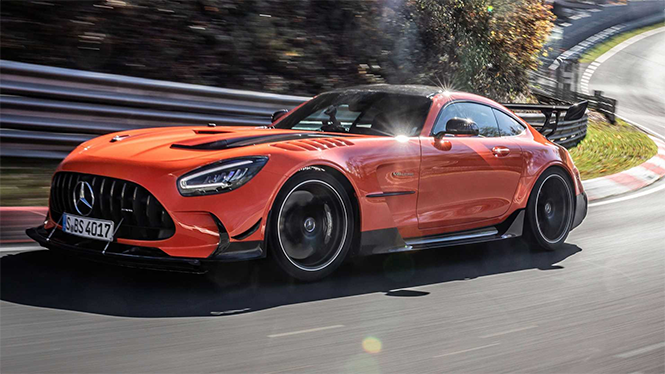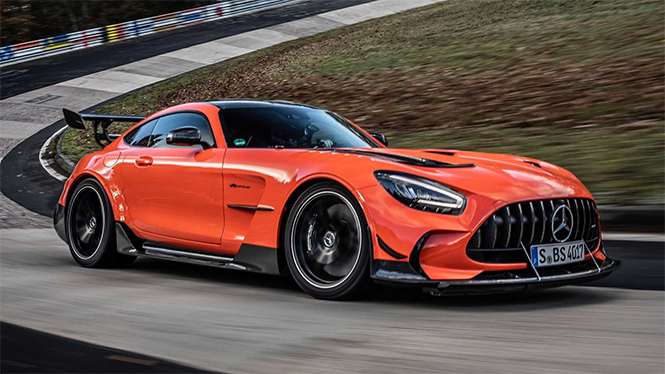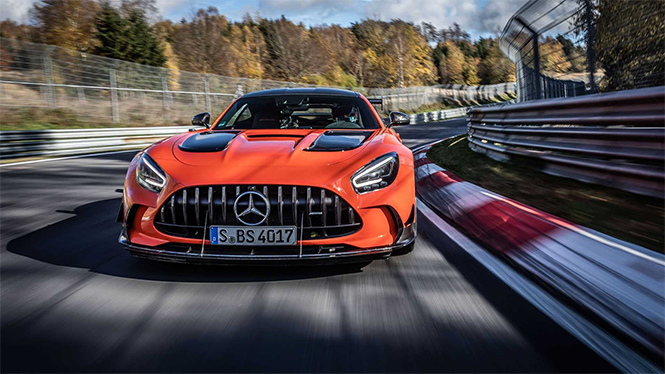DYATOM™ Discs: one of the secrets behind the Mercedes record at the Nürburgring
From its creation way back in 1927, the Nürburgring has been used by the world’s most important Constructors to put the strengths and flaws of their prototypes to the test. With a length of 20.8 km (19.9 mi) punctuated by 73 turns of every kind as well as many changes in slope and different surfaces, the Nordschleife is the most demanding test bench a car can face.
For good performance on this track – once also used for F1 – you need speed on the straights and the big turns, in changing direction and when braking as well as when accelerating. And you always need the utmost grip, since every tenth of a second lost on a turn can affect the final outcome.
 All that explains why every car manufacturer wants to be able to boast of holding the Nordschleife lap record. It long seemed impossible for a road-going car to break the 7-minute barrier, but since the early 2000s it has been broken a number of times, with Lamborghini managing to clock 6’44’’97 in 2018.
All that explains why every car manufacturer wants to be able to boast of holding the Nordschleife lap record. It long seemed impossible for a road-going car to break the 7-minute barrier, but since the early 2000s it has been broken a number of times, with Lamborghini managing to clock 6’44’’97 in 2018.
Many experts thought that this time was to remain an unbeaten benchmark for a long time to come, but things took a different turn a mere two years later: Mercedes took to the track with the AMG GT Black Series in the expert hands (not to mention feet) of Maro Engel behind the wheel.
The result was a record time of 6’43’’61, more than 20 seconds less than Mercedes with the same driver in the AMG GT R Pro in November 2018. This fantastic improvement for the German manufacturer came courtesy of the 3982cc twin-turbo V8 engine, which ensures a power of 537 kW (730 HP) and maximum torque of 800 Nm. Mercedes engineers succeeded in packing all this into a weight of just 1,615 kg (1.78 t).
 These thrilling figures lent the Mercedes AMG GT Black Series exciting performance on the Green Hell, which also came via tires, front and rear spoilers and of course Brembo brakes, which on the one hand mean shorter braking distances because of their constant performance and on the other improved dynamics and performance from the Mercedes AMG GT Black Series thanks to the low weight.
These thrilling figures lent the Mercedes AMG GT Black Series exciting performance on the Green Hell, which also came via tires, front and rear spoilers and of course Brembo brakes, which on the one hand mean shorter braking distances because of their constant performance and on the other improved dynamics and performance from the Mercedes AMG GT Black Series thanks to the low weight.
Innovative technology and solutions were essential to achieving this, such as the Brembo aluminum monobloc front calipers with 6 pistons and new DYATOM™ carbon-ceramic brake discs, developed by Brembo SGL Carbon Ceramic Brakes (BSCCB).
In addition to the characteristic light weight, performance and design that come from choosing aluminum over cast iron, Brembo front calipers can offer cars advantages connected with reduced residual torque, meaning enhanced performance that isn’t limited to braking alone.
 Given the high loads generated by pistons pressing on pads, and to ensure the utmost rigidity and less deformation, the calipers are monobloc, billet-machined from a single block of cast aluminum. The use of several opposed pistons also allows for better distribution of force on the pads and more even wear on the friction surfaces.
Given the high loads generated by pistons pressing on pads, and to ensure the utmost rigidity and less deformation, the calipers are monobloc, billet-machined from a single block of cast aluminum. The use of several opposed pistons also allows for better distribution of force on the pads and more even wear on the friction surfaces.
DYATOM™ discs are characterized by 5 carbon-ceramic layers and are particularly effective for intense use on the track. Lower temperatures in use mean greater pedal stability, less friction material wear and better performance as demonstrated by the Nordschleife lap record.
_pic.png) All of this is achieved despite slightly smaller dimensions than the carbon-ceramic disc discs currently used on other models in the Mercedes AMG GT series. These use front discs with a diameter of 402 mm and thickness of 39 mm (15.83" and 1.54"), whereas DYATOM™discs measure 400 mm and 38 mm respectively (15.75" and 1.5").
All of this is achieved despite slightly smaller dimensions than the carbon-ceramic disc discs currently used on other models in the Mercedes AMG GT series. These use front discs with a diameter of 402 mm and thickness of 39 mm (15.83" and 1.54"), whereas DYATOM™discs measure 400 mm and 38 mm respectively (15.75" and 1.5").
That might seem insignificant, but at these levels, as in Formula 1, where Brembo has been present since way back in 1975, every gram can make a difference. Brake discs are unsprung weight, so they affect the dynamics of the vehicle not only when braking but also accelerating and changing direction.
This is demonstrated by the lap time of 6’43’’61, which could be in place for a long time, just like the DYATOM™ discs, with a life many times longer than that of cast iron ones. In practice, they can last as long as the car they’re fitted to, if not longer.